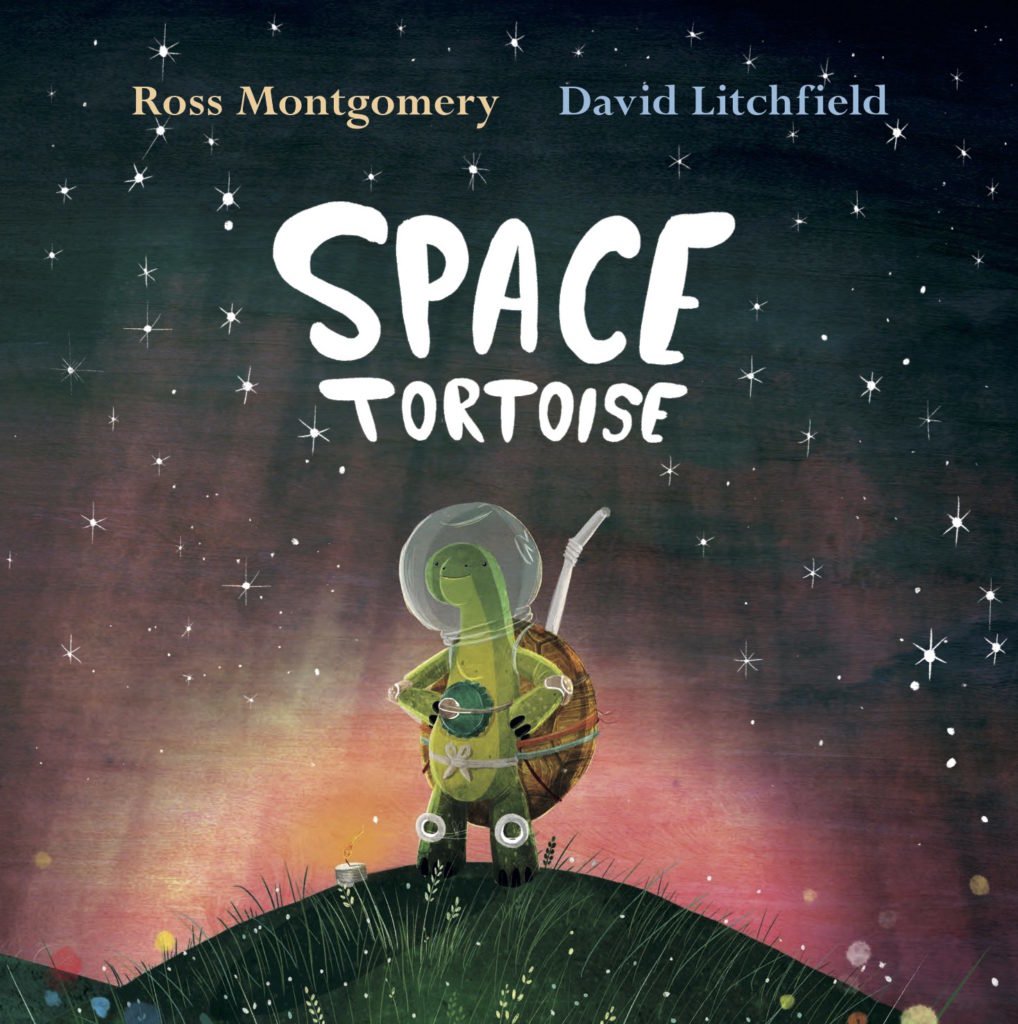Ross is the award-winning author of ALEX, THE DOG & THE UNOPENABLE DOOR (2013), THE TORNADO CHASERS (2014) PERIJEE & ME (2016), CHRISTMAS DINNER OF SOULS (2017), MAX AND THE MILLIONS (2018), THE BUILDING BOY (2016) and SPACE TORTOISE (2018)!


Your new book ‘Space Tortoise’ was released last year. Without giving too much away, can you tell us a bit about it?
Of course! SPACE TORTOISE is my new second picture book with the powerhouse that is David Litchfield (The Bear & the Piano). It’s the story of a lonely tortoise who lives in an old bin in an abandoned park, and who wants to travel to the stars!
What is it like working alongside the brilliant David Litchfield? How does the process work?
I love working with David – he’s very relaxed as well as being incredibly talented, and I know that he’ll inject so much heart and beauty into any story he’s given. The process is very odd – I’ll write the text, it gets sent to David, and then we have one meeting together along with the publisher’s art director to work out how each image would work, how the text would be separated and so on. By the time I next see it, it’s usually almost completely finished!
What would you say the main themes in your stories are?
I would like to think they’re kindness, empathy for others, responsibility and remembering to look at the world around you with wonder. In actuality, it’s making a funny animal do something weird.
I loved ‘The Building Boy’ – it’s beautifully written and very moving. What inspired this story? How important do you think it is for children to read about concepts such as death and loss? How can books help children’s understanding of these complex topics?

Thank you! I’m a huge fan of picture books about grief, and have a collection at home – I find it very moving that people have taken the responsibility to try and help children get their head around such a troubling topic. I believe passionately that there are almost no topics which should be off-limits to children – just because something is difficult to discuss or explain, it doesn’t mean that children can’t understand it. There are children all over the world who have to deal with loss and grief – why should we pretend this doesn’t happen? I understand that people choose to not talk about it out of kindness, but I feel it’s counter-productive. What matters is how you talk to them about it, how it’s presented.
It’s hard for me to remember how the story started – I wrote the very first draft in one night back in 2010 while I was frustrated writing my first MG book, ALEX, THE DOG AND THE UNOPENABLE DOOR! If I had to guess how it came together, I suppose that it reminds me of my mother’s dad – he was incredibly practical and had a basement filled with hundreds of odds and ends he could use to fix stuff. It was so exciting for a child! When I think of him, I always think of that basement – even though I don’t ever think I saw him in it.

Can you tell us a little bit about the inspiration behind ‘Max and the Millions’? What research did you carry out when writing the book?
MAX AND THE MILLIONS is about a boy who discovers a microscopic civilisation of ant-sized people living in tiny castles and fighting epic battles on his floor – think of a very small, child-friendly Game of Thrones! In order to save them from being destroyed, he has to work together with one of the tiny people – Luke, Prince of the Blue tribe.
I was inspired by a lot of things writing this book – the books of Terry Pratchett, the amazing work of microartist Willard Wigan, all of the stuff that used to make my head explode in biology class – but a really important element of the story is that Max is deaf and wears hearing aids. This was inspired by everything I learned working for five years with a man who wore hearing aids – he taught me so much about the issues that deaf people, and in particular deaf children, face every day, which I simply had no idea about.
I feel like there could be more to explore for Max. Have you got plans for a sequel to ‘Max and the Millions’? What might happen in it?
I haven’t got any plans for a sequel unfortunately! However ,a year or so ago, an 8-year old boy in America wrote to me with an idea for what could happen in the sequel, and it was such a genuinely fantastic and logical continuation of the story that I genuinely might steal it!
‘Christmas Dinner of Souls’ is a very atmospheric, spooky collection of gruesome stories! Have you always liked ghost stories? Do you have a favourite?

I ***LOVE*** ghost stories – for me, these stories came from a love of staying up late on Christmas Eve and scaring the living daylights out of myself by reading scary stories! I have a mixture of short stories and novels that I love, and there are far too many to list here. The last truly brilliant horror novel I read was probably THE HOUSE ON HAUNTED HILL or DARK MATTER by Michele Paver, but I’m always a fan of a short story that leaves you with a nasty twist and a sickening taste in your mouth. Think HIS BEAUTIFUL HANDS by Oscar Cook!
What does a day in the life Ross Montgomery look like when you’re writing?
I get all my writing done in the morning – I have in the past written in the afternoon, but I’m running on vapours by that point and I’ll achieve in two hours what I can do in the morning in twenty minutes. I usually write from 9am to anytime between 12-2pm, having two cups of coffee, and then reward myself for not hurling my laptop into a lake by having lunch. At the moment, I’m mainly writing at home and in my local Costa because they don’t get angry at how little I buy!
As a teacher, I’m always interested in an author’s point of view about inspiring a love of reading and writing in our children…
What are your earliest memories of reading and writing? Did you have a favourite story when you were younger?
I was always an avid reader and writer and listener of audiobooks. The first book I ever truly loved was called GING GANG GOOLIE, ITS AN ALIEN and was about a troupe of boy scouts who go on a camping trip and discover an alien who loves sausages. It was a mix of comic and storybook text, which is just so appealing when you’re still learning – it also came with the story on audiobook, which helped so much.
What advice would you give to teachers about how to develop reading for pleasure in their classrooms and schools?
There are so many ways of doing it, but I genuinely believe you have to show how much you love reading for pleasure yourself – and lots of adults don’t, which is part of the problem! When I was a teacher, the most effective thing I did was just to have a bookstand on my desk with a sign saying “MR MONTGOMERY IS READING…” above it, and every day I’d put my current book in it. Children would come up and talk to me about it – I’d explain what it was about, why I liked it, or maybe why I didn’t like it, and then turn the conversation to what they were reading! You have to model what enjoying a book is – what it looks like – what it sounds like.
What advice would you give to children who say they don’t like reading?
You’re not reading the right books! Saying you don’t like books is like saying you don’t like films, or you don’t like computer games. You’re not meant to like all films – there are some you like, some you hate, some that aren’t for you. It’s the same with books – if you don’t like what you’re reading, find something you do!
What advice would you give to any budding young authors?

Read loads and write loads. Read whatever you want – write whatever you want. Write something you feel is going to be fun to write. You’ve got the rest of your life to improve at the parts of writing that are important but dull – for now, explore whatever you want and find what you love about it! Oh, and get a notebook. Everyone says they have one but they just leave it at home.
Apart from your own books, is there another book or author you would recommend to children that you’ve enjoyed recently?
The last book I really, REALLY liked was THE STORMKEEPER’S ISLAND by Catherine Doyle – so funny and exciting and magical! I’m also a big fan of basically anything that Katherine Rundell writes.
Finally, can you you describe your new book ‘Space Tortoise’ in three words?
I could say “Tortoise in space”, but actually it wouldn’t be true – you have to read it to find out why! Instead I’ll say: sweet, silly, heartwarming.


